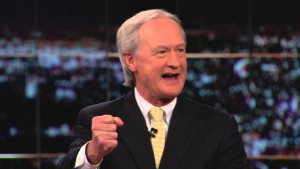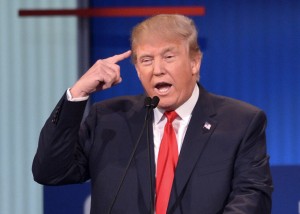Yes, that’s a real headline: it appeared in USA Today last month. Glosso is a little behind the curve here, having missed this important political news when it first broke at the beginning of October — but hey: it’s never too late to help educate the electorate, especially in the all-important matter of grammatical competence. If you’re still on the fence about which party or presidential candidate you’re going to support over the coming 12 months (but do hurry up, because you’ve only got a year left to decide), and grammar happens to be an important voting issue for you, we have some useful inside info, courtesy Grammarly. Here’s the scoop.
In a nutshell: Dems are more grammatically correct than Republicans — twice as correct, to be precise. And let’s just clarify that it’s fans we’re talking about here, not the presidential wannabes themselves. The grammar-checking app Grammarly studied the comments posted on the Facebook pages of all the presidential candidates, analyzing the grammatical competency and vocabulary usage of their respective fan bases. (Grammarly explains its methodology below.)
What Grammarly found was a stark divide between left and right. Those writing on the Democratic candidates’ pages made, on average, 4.2 mistakes per 100 words; GOP supporters were twice as sloppy, making 8.7 mistakes in the same amount of verbiage. Dem supporters also used a wider vocabulary, using on average 300 unique words per 1,000, while the Republican-lovers could scrape together only 245.
The five Democratic candidates (at the time of the study) — Lincoln Chafee, Jim Webb, Bernie Sanders, Martin O’Malley and Hillary Clinton, listed in descending order of grammatically-able followers — all achieved higher scores than their GOP rivals, except for Clinton, whose devotees matched in grammatical competence the fans of Carly Fiorina (the highest-scoring Republican).
Here’s the grammatical hall of fame and shame, in descending order by candidate (with numbers representing the average number of mistakes per 100 words made by their followers).
Lincoln Chaffee, Democrat, 3.1
Jim Webb, Democrat, 3.4
Bernie Sanders, Democrat, 3.7
Martin O’Malley, Democrat, 4.6
Hillary Clinton, Democrat, 6.3
Carly Fiorina, Republican, 6.3
Ben Carson, Republican, 6.6
Lindsey Graham, Republican, 7.2
George Pataki, Republican, 7.2
Ted Cruz, Republican, 7.3
John Kasich, Republican, 7.7
Jeb Bush, Republican, 7.9
Mike Huckabee, Republican, 8.0
Bobby Jindal, Republican, 8.2
Chris Christie, Republican, 8.3
Rand Paul, Republican, 8.4
Marco Rubio, Republican, 8.8
Rick Santorum, Republican, 11.5
Donald Trump, Republican, 12.6
Grammarly’s methodology explained:
We began by taking a large sample of Facebook comments containing at least fifteen words from each candidate’s official page between April, 2015 and August, 2015. Next, we created a set of guidelines to help limit (as much as possible) the subjectivity of categorizing the comments as positive or negative. Since the point of the study was to analyze the writing of each candidate’s supporters, we considered only obviously positive or neutral comments. Obviously negative or critical comments, as well as ambiguous or borderline negative comments, were disqualified.
We then randomly selected at least 180 of these positive and neutral comments (~6,000 words) to analyze for each candidate. Using Grammarly, we identified the errors in the comments, which were then verified and tallied by a team of live proofreaders. For the purposes of this study, we counted only black-and-white mistakes such as misspellings, wrong and missing punctuation, misused or missing words, and subject-verb disagreement. We ignored stylistic variations such as the use of common slang words, serial comma usage, and the use of numerals instead of spelled-out numbers.
Finally, we calculated the average number of mistakes per one hundred words by dividing the total word count of the comments by the total number of mistakes for each candidate.
* * * * *


